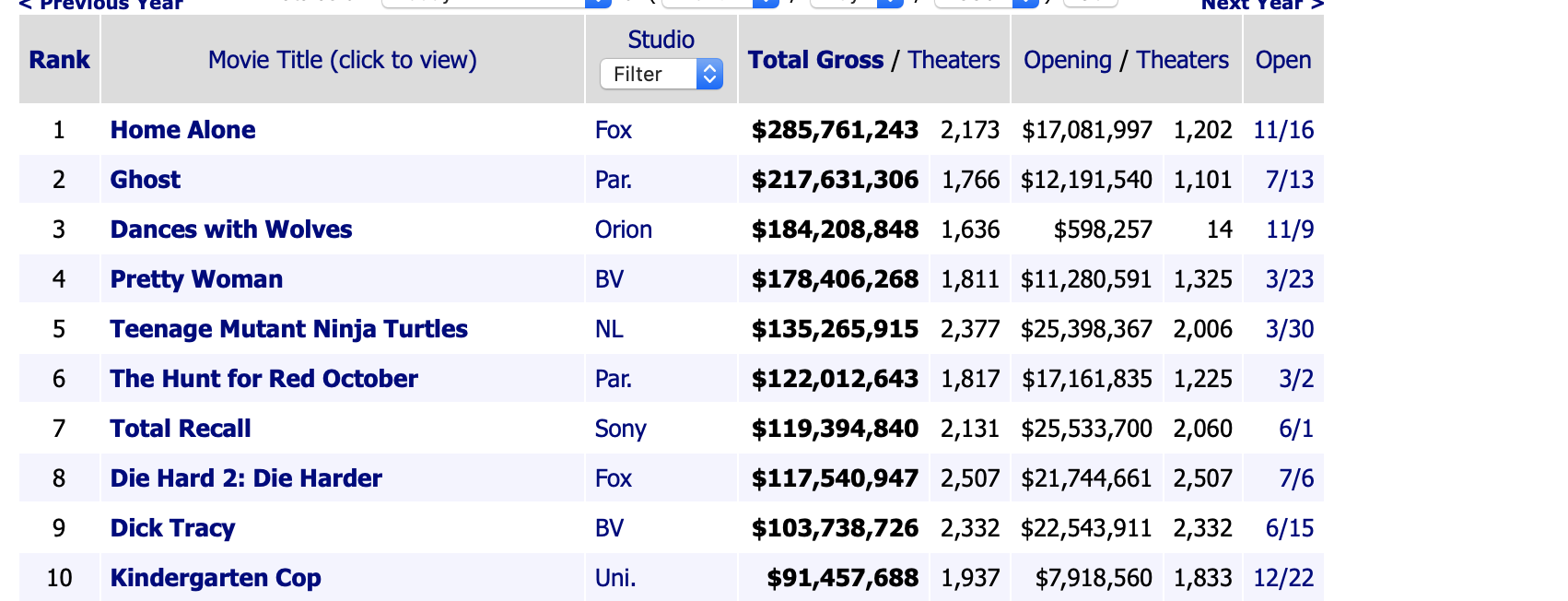The critics have spoken. Roma has far and away been acclaimed the best film in 2018. Many in the Oscar industry that chirp and buzz in the months leading up to the Oscars are worried Best Picture will be Roma. They’re worried because this was the year we were going to make the Oscars popular again. From Anne Thompson at Indiewire to Kyle Buchanan at the New York Times, top prognosticators are saying the win should go to Black Panther because that will make the Oscars relevant again. Scott Feinberg at the Hollywood Reporter says that it COULD win, especially if it wins the SAG ensemble award (should it be nominated). That will mean the awards aren’t insulated from the public at large, that the Academy has their finger on the pulse of American culture, that they will not have to resort to a dreaded separate category. NBC News has even declared that the only way to SAVE THE OSCARS is to award Best Picture to Black Panther.

The writer quotes an anonymous executive: “The only interesting question this entire award season is whether or not voters reward ‘Black Panther,’” the Hollywood executive said. “If they do, they understand that there is a path to awards being relevant in terms of popular culture. If they don’t, they will continue to make awards more and more irrelevant to the masses.”
Yes, relevant to popular culture. Isn’t that what happened to Broadway when they began building shows that would appeal to tourists visiting Manhattan? Isn’t it a miracle when a Hamilton breaks through? A wholly original, risky work that came straight from the imagination of Lin-Manuel Miranda? But that isn’t where Big Hollywood is right now. That’s because Big Hollywood isn’t the Hollywood of yore anymore, no longer the crucible of American cinema. Now it always has an eye on international box office. Have you noticed that the films that do really well in a given year are remakes, or part of a franchise, or come from the cloth of something that was already made before?
One argument that can be made in defense of recycling ideas would be, well, movies adapted from books are still adaptations, so how are remakes or sequels much different? Isn’t an adaptation an adaptation and it doesn’t matter what the source material is? A lot of audiences are reluctant to spend money on something unless they know for sure what they’re going to get. This is true of the fast food business model too: the same dozen restaurants you see dotting every interstate all across America. They know they make more money if they limit the choices, guarantee consistency, and give people what they’ve come to expect, maybe introduce something new every now and then as a trial balloon as long as its equally ordinary.
Or perhaps a deeper reason that the Oscars have seemed to become “irrelevant” is that studios selected the audiences out of the process, or rather, herded the movies they liked into exclusive corrals. The Art of Cinema, as so many of us define it, as boomers in their 60s define it, sprang from the loins of Cahiers du Cinema, of the cinematic giants that analyzed and informed film history, shaped it, created a set of aesthetic guidelines that sought to separate cinema from easy entertainment. Truffaut, Bergman, Hitchcock, Bunuel, Rossellini, Kurosawa: these were some the key influencers who birthed the new wave of mavericks in the 1970s — Scorsese, Coppola, Freidkin.
Back before things really changed, the Oscars simply rewarded the films that made the most noise in a given year, whether it represented cinematic innovation or because it was impeccable entertainment.
Take a look at the way the top box office films have evolved over the years.
In 1975:

Then 1980:

1990:
 2000:
2000: 
2012:
2013:
2014:
2015:
2016:
2017:
2018:
You can see how dramatically the box office has shifted away from the kinds of films that used to be collectively defined as cinema towards something else — some kind of hybrid of films and sensory experiences on par with video games, virtual reality, new media. It’s all changing so fast.
In the years since 2000, when I first started covering the Oscars, it was clear that Hollywood was changing. Much of this had to do with the manipulative savvy of Harvey Weinstein. He knew how to give a large faction of Academy members the kinds of films they wanted. That led to the rise of the indies in the Oscar race, which in turn led to studios splitting off their main product to their indie branches to match what Miramax was doing. Focus Features, Sony Pictures Classics, Fox Searchlight, Paramount Vantage: they began the search to develop the “Oscar movie” — films that did not require the public’s pre-approval to be defined as success. That split led to the creation of a whole new species. Though there were crossover films that were both critically acclaimed and popular (like Gravity, The Martian, American Sniper), it was clear that there were now two different species of film existing and evolving separately from each other.
Now there is a new kind of hybrid that has cropped up: the inclusive blockbuster. The way that many younger people define “good” isn’t how cinematic it is, but rather how inclusive or instructive it is. A movie like The Force Awakens is celebrated not because it’s original (it isn’t) but because it has a female lead and a diverse cast. The same goes for the upcoming Mary Poppins Returns, or even A Star Is Born. The only thing worse than being called unoriginal is being called out for excess straight whiteness, which can quickly get a film branded as racist or homophobic or transphobic. If inclusive elements are absent in a film, that lack thereof can kill it outright. Not saying that such awareness and sensitivity isn’t honorable and long overdue. But as long as you follow those guidelines and check off the prerequisite boxes, anything goes. Boom goes the box office.
If the strictest definition of cinema is reserved for the critics, the awards community, and the industry, and if it never bleeds out to the rest of the population, then that definition, that standard is going to fade. Eventually.
A movie like First Man, despite being wildly cinematic (one of the most breathtaking and original movies about space travel ever made), has a tough time finding relevance in a culture that measures worth by how inclusive or redefining or deconstructionist it is on politics or identity. First Man can claim none of these things and was even attacked (by white critics) for celebrating white men at a time when wide swaths of American culture have become so blatantly racist. That means you can’t really make a movie about the 1960s NASA space program unless it’s less about the white people who made that history but rather about those who were left out and left behind.
If your definition of “good” of “worthy” is that it can only apply to art that’s inclusive or instructs society about how the world ought to be (as opposed to how it was and is), then it is no wonder that so many films are put through a strident purity test to make sure every single thing about them is “right” or “good” to mirror our utopian idea of ourselves.
Can Green Book just be a good movie? Is First Reformed less relevant because its protagonist is a white male in a mostly white town? Do people love movies like The Hate U Give more because they celebrate the very thing we all need to be caring about? How do we define “good” anymore? We seem to be at a crossroads, caught between an old worldview and a new one, redefining what moviegoing actually means, scrutinizing the very act of deciding which movies to see.
Movies like Martin Scorsese’s The Departed, when glimpsed through the lens of the culture that demands every film instruct society on how we should behave, may not be considered right-minded enough to win Best Picture today. It crackles with brilliant dialogue, it tells a truth, but it stars almost all white men and racial epithets are used throughout, from the very first shot. So many great films of the past, when put through the sausage grinder of today, would fail to meet appropriate criteria. Try watching Scent of a Woman through the lens of the #MeToo movement. Just try. Every so often in American film history you’ll find a movie that accidentally reflects today’s idea of what art should say, but it’s almost like playing the lottery. Good luck.
And it isn’t as though the critics have become immune to the utopian ideal. They’re right there too. They have to be if they want to avoid social media crucifixion. They know that the movie they choose has to withstand scrutiny of the hive mind that is poised to rip them apart and call them out. That extreme has understandably risen out of the other extreme: when movies only told stories about white people for white people. But has the pendulum swung so far that any movie about white people looks somewhat suspicious?
Black Panther now sits at the apex of this peaking awareness. A hybrid somewhere between a great piece of cinema and superlative prepackaged entertainment. What is so moving about Black Panther isn’t that it dwells in the familiar realm of Marvel franchise but rather that it charts its own course to celebrate African culture. Wakanda offers up what is worth celebrating but rarely is: black power, black grace, black achievement, black history, the long-ago stolen past. The film argues that Wakanda cannot stay where it is, but it must spread out to places where it’s most needed. Black Panther the film makes this wish come true. It spreads Wakanda in the places it’s most needed and that is one of the things that makes this an important film.
This year’s Oscar race may come down to Black Panther (the highest grossing film of the year) and Roma (whose box-office haul is not a primary concern). We can see why Black Panther represents much more than the money it has made. But let’s not forget that films once defined as pure cinema are now thriving in one of the last terrains that it can actually find roots: Netflix. The choice between two movies so different may be rightly regarded as a battle for the soul of the Academy. Netflix offers film artists a way out of having to measure their success by the profit they can churn. The tiresome default argument against such films seems to be that people would rather stay home and watch Netflix than go out and sit in the movie theater. But unless you own stock in a studio or a theater chain, why should that matter to you? (Believe it or not, people once went to movies and had not the slightest clue what those movies earned on opening weekend.)
But to many in the industry who are so focused on the bottom line, Netflix represents a bigger threat than tentpole franchise movies ever will: it threatens to alter the way people watch movies. (As if that hadn’t already happened 50 years ago, with TV, VHS, DVD, Blu-rays, and now 4K-Ultra. How many devoted movie-lovers alive today would never have seen Citizen Kane or Psycho or Lawrence of Arabia if they couldn’t watch movies at home?)
To save the Oscars, the Academy and the industry are being told to embrace the new normal, or as Lynda Obst calls it, the new abnormal. Remakes are okay. Franchises are good for Hollywood. International box office numbers blow so many minds and pad so many pockets and entertain so many worldwide, how is anyone to argue?
Somewhere between the elite insular world of critics and the sell-out capitalist-driven new model of Hollywood, a path must remain for actual pure cinema to forge and explore. It has to. The art of the thing still has to matter.
I’ll never stop believing that two categories for Best Picture isn’t a good idea. The reason being if the Academy decides that the only criteria for Best Picture is whether it is popular or not, knowing how popular taste is so fleeting, Oscars’ own history risks becoming even more irrelevant.

















